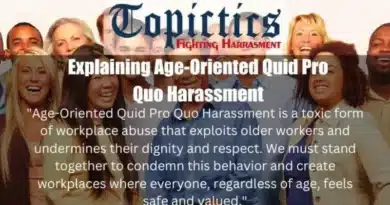Understanding Domestic Quid Pro Quo Harassment
Takeaways
| Key Points |
|---|
| Domestic quid pro quo harassment refers to a form of sexual harassment that happens within personal or family relationships, where one partner or individual in a position of power offers something—such as financial support, housing, or other benefits—in exchange for sexual favors or compliance. |
| This type of harassment mirrors workplace quid pro quo harassment but occurs in a domestic setting, making it more difficult to identify and address. Victims may feel trapped, as rejecting the advances could lead to losing essential support or facing other consequences. |
| This issue is significantly underreported and poorly documented, primarily due to the private nature of domestic relationships and societal pressures that often prevent victims from coming forward. |
| People in such situations may not realize they are being harassed or feel that fewer legal protections are available than workplace harassment. |
What is Quid Pro Quo Harassment?
“Quid pro quo” is a Latin term meaning “something for something,” typically referring to an exchange where one party offers something of value in return for a favor or service. When applied to harassment, quid pro quo involves someone in a position of power offering or threatening job-related consequences (such as promotions, benefits, or demotions) in exchange for sexual favors.
In domestic settings, this dynamic can occur when one partner uses control over resources, family decisions, or personal autonomy to demand something in return for basic needs or privileges, creating a coercive and toxic environment. However, the term “quid pro quo” is not typically used in legal contexts to describe domestic relationships, though similar abusive power dynamics may exist. Sources focus on workplace and educational environments, and there is less established language for domestic contexts.
Domestic Quid Pro Quo Harassment Explained

While quid pro quo harassment is most commonly associated with workplaces, it also exists within domestic relationships. Domestic quid pro quo harassment occurs when a partner or family member leverages their position of authority or control within the household to demand sexual or personal favors. These demands can be explicit, such as offering financial stability or childcare support in exchange for compliance, or they can be implicit, using threats of withholding affection, resources, or emotional support.
For example, a partner might refuse to provide financial assistance unless the other partner complies with sexual requests. In some cases, this type of harassment might involve subtle manipulations, such as withholding basic necessities and coercing compliance, sexual favors, or obedience until certain demands are met. This manipulation often creates a toxic imbalance of power that the victim may struggle to resist due to dependency.
Recognizing Domestic Quid Pro Quo Harassment

Domestic quid pro quo harassment is particularly harmful because it blurs the lines between emotional abuse, financial manipulation, and coercive control. Victims often feel trapped and powerless due to their dependence on the abuser for critical resources. Identifying this form of harassment involves recognizing key warning signs, including:
- Conditional Offers: One partner offers something (such as financial support, household duties, or childcare) only if the other partner meets their demands.
- Threats and Retaliation: The harasser may threaten to withhold essential resources or retaliate in other ways if the demands are not met.
- Dependency: Victims are often financially or emotionally dependent on their abuser, making it difficult to escape the situation without external support.
The Impact on Victims
Victims of domestic quid pro quo harassment experience significant psychological, emotional, and sometimes physical distress. This type of manipulation creates a deeply harmful environment that can erode a person’s self-esteem, autonomy, and mental well-being. Over time, victims may feel trapped in the abusive relationship, believing that they have no way out due to their reliance on the harasser for basic necessities.
Psychological effects include heightened anxiety, depression, and feelings of worthlessness. The prolonged stress from living in an abusive environment can also lead to physical health problems, such as insomnia, headaches, or other stress-related conditions.

Legal Protections and Challenges
Quid pro quo harassment is illegal in many settings, especially in the workplace, but domestic cases are much harder to prosecute. Domestic quid pro quo harassment is underreported for several reasons, including the private nature of the relationship and the victim’s fear of retaliation. Many victims do not have access to the legal resources needed to report their harassers or lack the financial independence required to escape an abusive household.
Victims who attempt to report domestic quid pro quo harassment may face skepticism or difficulty in proving the nature of the abuse. Since these situations often involve manipulations and implicit threats rather than clear legal violations, law enforcement and legal professionals may struggle to build a case. However, some regions are beginning to acknowledge this issue within broader frameworks of domestic violence and coercive control laws.
Why is Domestic Quid Pro Quo Harassment Underreported?

One significant challenge in addressing domestic quid pro quo harassment is its relative invisibility compared to more overt forms of domestic violence or sexual harassment. There are several reasons why it is underreported:
- Stigma and Shame: Victims may feel ashamed to admit that they are being manipulated or coerced by someone they trust, especially in intimate relationships.
- Financial Dependence: Many victims stay silent due to financial reliance on their abuser, making it hard to leave or seek help.
- Lack of Awareness: Many people do not realize that quid pro quo harassment can happen in domestic settings, which limits their ability to recognize or report it.
Conclusion
Domestic quid pro quo harassment is a deeply damaging form of abuse that often goes unnoticed and unreported. While legal protections exist for workplace harassment, the domestic sphere remains challenging due to the personal, private nature of the relationships involved. Greater awareness and stronger legal frameworks are needed to protect victims and provide them with the resources to escape such harmful environments.










Comments are closed.